- Home
- Lincoln Cole
The Everett Exorcism (World of Shadows Book 1) Page 3
The Everett Exorcism (World of Shadows Book 1) Read online
Page 3
That provided the job of an exorcist—to form an anchor for people lost at sea. He could offer forgiveness to the unforgivable and help people regain control of their lives.
Forgiveness, Father Paladina had learned, proved something difficult to come by. Some people believed they weren’t worthy of it, and that they had no right to ask for such. His duty in his capacity as an exorcist was—or would be, considering that the Church had never asked it of him—to offer that unquestionable forgiveness and salvation.
In any case, they hadn’t sent Father Paladina here to help lead this bishop out of ignorance. He had more important matters to attend to, and this visit only offered a courtesy.
A wasted one, but a courtesy nonetheless.
“Father Reynolds called upon the Church to ask for help with a sensitive situation, and whether or not you agree with his request, it remains our duty to support him in any capacity we might. I came here so that I can offer him assistance.”
“For now,” the bishop said, sipping his drink.
Niccolo tilted his head. “I’m sorry?”
“This isn’t the first time Father Reynolds has acted outside the best interest of the Church, and I don’t believe it will make for his last. At a certain point, his mistakes will surmount the power of his friends, and the Church will have no choice except to take action against our young friend.”
“You believe he will end up excommunicated?”
“It seems a distinct possibility. The Church follows a certain set of rules and expectations. Continually stepping around those systems can result in negative repercussions.”
Niccolo had assumed a small possibility that the bishop might take his visit personally, but now his concern became fully validated. If the bishop felt willing to go through the arduous process of having Father Reynolds removed from the Church simply because the priest had spoken up, then he must dislike the man seriously.
That, however, was none of his concern. It presented an issue—and a fight—for another day. He took a steadying breath and asked about dinner. From the expression on the bishop’s face, it became clear that he had overstayed his welcome. Dinner seemed like a distant prospect now.
That didn’t bother Niccolo much, though. In speaking with the bishop, he found that he’d lost his appetite.
“Thank you very much for your time,” he said, shaking the bishop’s hand once more.
“No, thank you,” Bishop Glasser said. “I truly appreciate your honesty in this matter.”
“I merely wanted to ensure that we would have no hard feelings regarding the tenuous situation we both face.”
“Of course,” the bishop said, “and I would like to assure you that there are absolutely none.”
His expression, however, made it clear that there would be hard feelings. Niccolo didn’t much care. He hadn’t come here to make friends, and he wouldn’t shirk his duty to make Bishop Glasser happy. His task at hand ordained that he analyze the situation and make a determination for the Church about whether an actual exorcism would prove necessary.
If, in his dealings, he reported back that it would, then no doubt they would send someone else to deal with it. Someone more appropriate to handle a situation like this. That seemed perfectly fine for him.
In either case, his only goal tonight had been to warn the bishop about the investigation before it began so that the man didn’t get blind-sided by his showing up in the city. Niccolo considered it a courtesy both necessary and polite, and now that he had taken care of it, he could move on to the rest of his concern.
“Then, if our business is concluded, I would like to get back to my hotel to rest for the night. I have grown exhausted from the trip.”
“You won’t stay for dinner?”
“I would rather not infringe upon your hospitality, and I am afraid I would not make for good company. I am simply too tired.”
“I understand. My driver will, of course, drive you back to the city.”
After saying this, Bishop Glasser rose from his chair and leafed through miscellaneous papers on his desk. The dismissal seemed clear, and Father Paladina wasted no time in heading out of the room and back down the staircase to the front entrance.
The butler led him outside and gestured his hand toward a waiting car. The cool night air washed over the priest, chilling him, and he wanted nothing more than to get away from the bishop’s estate and back to his hotel.
◆◆◆
By the time Niccolo made it back to his room, he felt bone-weary and could barely stay on his feet. He’d thought he felt tired earlier, but this seemed something else altogether. The jetlag had gotten to him, and he felt as though he could sleep for a few days, if not weeks.
However, when he laid on the lumpy mattress and shut his eyes, he found that sleep wouldn’t come. His mind spun, replaying the conversation with the bishop and pondering the circumstances that had brought him to this city.
The meeting hadn’t gone at all how he’d expected. He didn’t like the bishop, nor did he respect the man. The man’s demeanor held something unsettling. An unpleasantness that seemed to permeate the entire estate, and the more Father Paladina ruminated on it, the more pervasive that feeling of unease became.
But that reflected his personal feeling about the man, not a professional one. He simply didn’t like the bishop; however, that didn’t make Leopold any less capable of performing his duties for the Church. Father Paladina couldn’t let his personal feelings influence his investigation.
In either case, the time had come to meet with the man who had summoned him to Everett, Washington. He would meet with Father Jackson Reynolds in the morning at his church downtown. Then he could get the younger priest’s perspective on the issue and start making some headway.
This initial meeting would give him the chance to discuss the matter at hand and introduce himself, and he hoped it would go better than his dinner engagement tonight had. He still felt hungry.
It would be important, he reminded himself, to stay neutral in the matter and examine the facts. He couldn’t allow his dislike of the bishop to sway these dealings in any way.
Mostly because the bishop probably had it right. To be honest, he agreed with the bishop that, likely, there would be nothing here in Everett to find; certainly not a demonic possession. Father Reynolds, young and ambitious, had risked a lot to get him here, but the likelihood that any need existed for an exorcist in this town remained incredibly slim.
Maybe Niccolo would manage to convince Jackson to help Rose Gallagher seek more mundane assistance, perhaps through a therapist or other healthcare professional. That would provide the best outcome for everyone involved, including the woman. Then Niccolo’s duty would shift from determining the need for an exorcism to smoothing over the rift between the bishop and the young priest.
That, however, didn’t seem like an easy job either.
Satisfied that he would find an equitable resolution to the situation and get on a flight back to his home in Rome in only a few days, Father Niccolo Paladina finally found sleep.
Chapter 3
When Niccolo woke up the next morning, he decided to go for a walk to reach Saint Joseph’s Cathedral and get a better sense of his surroundings. Everett seemed a small and quaint little city, comfortable and old-fashioned in a way Niccolo found appealing aesthetically.
The best part came from how quiet and remote it felt. The area reminded him of his neighborhood in Rome, and the more he saw of Everett, the more he liked.
It had dawned a beautiful morning, the veritable antithesis to the previous evening when he’d first arrived, and he felt well rested. The gloom and lethargy he’d experienced had washed away. The lumpy hotel mattress had turned out more comfortable than expected, or perhaps he had simply grown too tired to care. Either way, he felt great.
And ravenous, considering he hadn’t eaten dinner the previous night with Bishop Glasser. His hunger would have to wait a while before getting sated, however, because he didn’
t want to arrive late. He’d woken later than intended and hadn’t managed to sit and eat anything before heading to the church to meet with Father Reynolds. Niccolo considered the young priest a punctual man and dared not keep him waiting.
He strolled through the city, enjoying the sights and solitude of it all. Most of the locals appeared already hard at work or going about their daily lives, and so the streets seemed barren. The air tasted fresh after the night’s rain, and everything struck him as relaxed and peaceful.
Saint Joseph’s Cathedral, a small church, had barely enough seating to handle thirty guests during a sermon, but in the small town of Everett, Washington, it seemed rather large compared to the surrounding buildings. The front door, made of thick and heavy oak, had ornate patterning. It seemed a pleasant little parish with a lot of character and charm, similar to ones Niccolo had visited many times in his life.
The door stood cracked open, and Niccolo eased it aside and went in. He took a moment to survey his surroundings—he could learn a lot about a priest from the way he kept his church: clean or dirty, cluttered or neat, welcoming or foreboding? This church appeared clean but cluttered and had a warm and welcoming feel to it; all good signs of a priest whose door always stayed open to his congregation.
He found the young priest in the main hall of Saint Joseph’s Cathedral near the main entrance. Jackson looked up when Niccolo strode in, a smile widening on his face.
“Good morning,” Father Reynolds said, standing up and dusting off his hands.
“Good morning to you as well,” Niccolo said.
They shook hands, and then Jackson gestured for him to follow. The young priest, busy cleaning the hardwood floor of the cathedral with a mop and bucket, immediately pushed it aside.
Jackson Reynolds, a striking man, had dark skin and eyes and soft facial features. He stood a full head above Niccolo and would have looked intimidating, but the shy and reserved way in which he carried himself made him seem the exact opposite.
He wore his head shaved, and the only facial hair he sported formed a goatee around his mouth. He looked barely into his twenties, though with a maturity that greatly belied his age. Niccolo didn’t know his exact age but guessed him at least a decade younger than himself. Just seeing the priest standing there made Niccolo feel old.
Within seconds, Niccolo could understand why Jackson had become so popular at the Vatican. He had an affable demeanor, unlike Bishop Glasser, and appeared strikingly handsome.
“How was your trip?”
“Quite long, but not unpleasant.”
“I’m glad to hear it. I’ve made the trip to and from the Vatican, and it is no small feat.”
“It isn’t the worst trip I’ve made,” Niccolo said.
“Traveled much? I should like to hear some stories later. Please, have a seat.”
“No, thank you,” Niccolo said. “I’ve sat enough these past few days and would like to spend some time on my feet. I saw you mopping the floor a moment ago. Don’t you pay someone to clean the church?”
“I do. A woman named Amanda Lockett comes by a few nights a week to take care of the place and should arrive sometime tomorrow.”
“Then, why are you mopping?”
Jackson frowned. “I detest having someone else clean up after me. I hired Amanda because she could use the help and is fantastic company, but I’m not opposed to cleaning up my messes. I always clean in the mornings before she arrives. At least to the best of my abilities.”
“Doesn’t that defeat the purpose of hiring someone else to clean?”
He shrugged. “She is a single mother and takes care of three children at home. I consider myself privileged to give her this opportunity to make a little extra income.”
Niccolo acquiesced. “It’s your parish.”
Jackson seemed rather embarrassed just by the comment, as though Niccolo had insulted him. That hadn’t been his intention, but he didn’t know how to say so without making the situation even more awkward. He chocked it up to Jackson simply being a timid man.
In any case, Jackson seemed like a sincere person. Niccolo had met many priests like him, the kind who took their jobs seriously but didn’t have large ambitions.
Not that it made for a bad thing. Niccolo didn’t have big ambitions either. He used to when a young man, but as he got older, his world-changing ideas had slipped away.
Life had a way of stealing one’s plans.
“I can sympathize,” Niccolo said. “Have you nearly finished with cleaning? Would you like some assistance? I’ve been known to use a broom a time or two in my life.”
“No, I believe it is quite all right. Everything seems clean enough now that I won’t feel embarrassed when Amanda arrives. I merely occupied myself until you got here.”
“I apologize. If I had known you would have to wait, I would have come early.”
“No, no. Think nothing of it. I couldn’t sleep and decided to come in early. In truth, I haven’t slept well in general lately. Not since …”
He trailed off, showing himself unable or unwilling to voice aloud his thoughts about the possible possession.
“I understand,” Niccolo said.
“Would you prefer that we go into the back rooms to talk, or is this acceptable? I rarely have visitors during the week, but if you would prefer more privacy?”
Niccolo’s stomach emitted a low rumbling sound. “Ah, please excuse me. I haven’t eaten anything yet this morning and had hoped that you might know of a place where we could talk over breakfast.”
“Of course. The town has a diner close by that serves an excellent brunch. It only takes a short walk from here.”
“That sounds excellent.”
“Give me a moment to put the mop away, and I will be ready to go.”
Niccolo nodded, and Father Reynolds returned to his bucket. He pushed it across the floor and into one of the back rooms. Niccolo turned and glanced over the rest of the church. It had a tall ceiling and appeared well lit with natural lighting, but he found that he didn’t much care for it. The pews seemed too tightly packed, and it didn’t feel open enough for him. He liked spacious buildings, and this one struck him as too cluttered.
Niccolo had never had a parish of his own. His life hadn’t gone that way—not in the cards, so to speak. A few opportunities had arisen over the years, but he had turned them down. In many ways, he regretted it as another offer seemed unlikely to come along. His life of service at the Vatican felt fulfilling and complete, and he had become an important member of the clergy, but a selfish part of him would have liked to head a church like this with a small parish of his own.
He couldn’t bite back all of his envy for the young and well-respected priest.
A few moments later, Jackson returned, wiping his hands on a towel. He had grabbed an overcoat and umbrella, and with a nod, the two priests headed toward the door.
They walked out of the church and down the sidewalk to the west. The sun had peeked its way through the clouds and felt warm on his skin. Niccolo enjoyed the weather and remained grateful that they didn’t have to use their umbrellas.
“It rains quite a bit, I’ve heard.”
“That it does,” Jackson said. “You came at exactly the wrong time. It’s supposed to rain on and off for the next two weeks.”
“Better than snow,” Niccolo said.
“That’ll come in about a month. We’ve had unseasonable warmth. Of course, this is also better than spring. That’s when we really get the rainfall. This is more like light showers.”
The diner that Jackson had spoken of turned out to lay only a few blocks away; a small building that looked like it had gotten dragged forth from the fifties. A bell tinkled overhead when they entered, and swing music played from speakers set around the ceiling. Niccolo recognized the tune as In the Mood. The music played loud enough to hear in the background but not too loud to interfere with anyone’s conversation.
They arrived after breakfast and before lunch. The din
er seemed mostly empty, with only a quarter of the tables and booths occupied. Most of the current patrons looked of the older generation and sat alone with newspapers, sipping on coffee.
A server came out from behind the counter and greeted them, a middle-aged woman, slightly overweight, and with ruddy cheeks and shaking jowls. She had dirty-blonde hair pulled back into a haphazard ponytail with loose strands going everywhere.
“Welcome to Patty’s,” she said to Niccolo as they walked further inside. She nodded at Jackson. “Hello, Father Reynolds.”
“Hello, Patty,” he said, smiling at her.
“Who’s your friend?”
“Father Niccolo Paladina, from Italy. He’s visiting for the next few days.”
“Oh? Vacation? Seeing the sights and sounds of our pretty little backwater town?”
“Just business,” Jackson said, attempting—and failing—to sound nonchalant.
She tilted her head to the side but didn’t pursue the issue. Instead, she offered her hand to Niccolo, and he shook it. It felt a dainty handshake, and he didn’t dare squeeze her hand too hard.
“A pleasure to meet you,” he said.
“How are you enjoying Everett?”
“I love it,” he said. “It reminds me of all the best parts of home.”
She smiled and turned back toward Jackson. “Just the two of you today?”
“Yes.”
She picked up two plastic menus from a nearby counter and waved them in the air to beckon the priests forward.
“Right this way, gentlemen.”
The waitress led them over to a booth by the window and set down the menus, prattling on to Father Reynolds about her patrons and how nice the weather was and how much she’d enjoyed his last sermon on Sunday. She spoke quickly and never seemed to stop for air.
Jackson listened to her politely, offering input where necessary. It seemed clear from Jackson’s expression that they made for longtime friends and that this proved normal behavior for Patty.

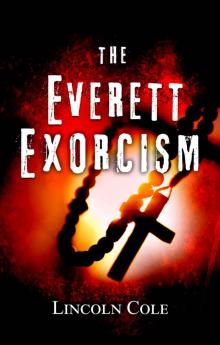 The Everett Exorcism
The Everett Exorcism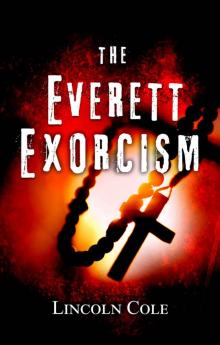 The Everett Exorcism (World of Shadows Book 1)
The Everett Exorcism (World of Shadows Book 1)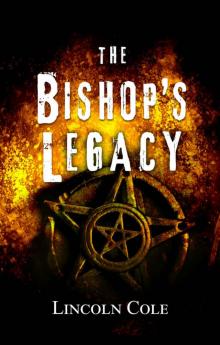 The Bishop's Legacy
The Bishop's Legacy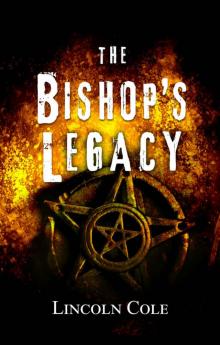 The Bishop's Legacy (World of Shadows Book 3)
The Bishop's Legacy (World of Shadows Book 3)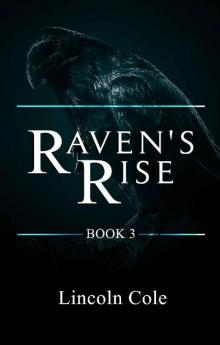 Raven's Rise (World on Fire Book 3)
Raven's Rise (World on Fire Book 3)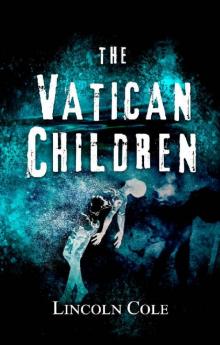 The Vatican Children (World of Shadows Book 2)
The Vatican Children (World of Shadows Book 2) Raven's Fall (World on Fire Book 2)
Raven's Fall (World on Fire Book 2)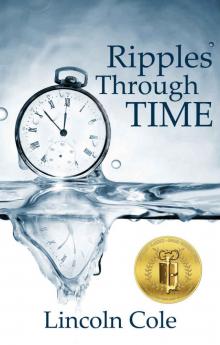 Ripples Through Time
Ripples Through Time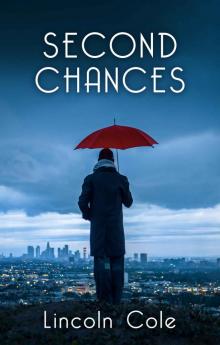 Second Chances
Second Chances Graveyard of Empires
Graveyard of Empires